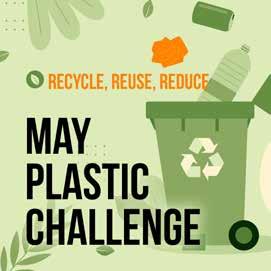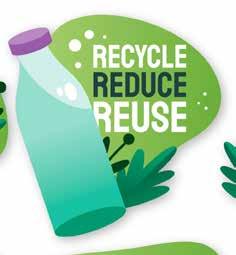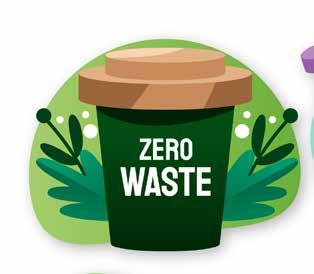
4 minute read
HOLY GROUND
CARING FOR GOD’S CREATION
In our Easter worship series, Holy Ground, we have considered how our faith compels us to care for God’s creation and creatures. We hope you are inspired to grow in your practice of composting, saving water, recycling, planting trees, taking care of the animals, and reducing your purchases of new and single use items. Here are a few details related to the hands-on practices we shared in the welcome center in April and May.
UWF Upcycling:
The United Women in Faith have a long history of supporting efforts in caring for creation. The UWF at Hyde Park UMC currently collects plastic lids, pill bottles no-longer- needed eyeglasses, vases to reuse for various other ministries.
The book Climate Justice, done recently as a Tuesday morning study, is published by the UWF. Check with the church office if you would like a copy. For more information about the work of the UWF, check out https://www.uwfaith. org/what-we-do/serve-and-advocate/ climate-justice/
Composting:
To get started–
Check out this booklet for home composting: https://www.hcdoes.org/DocumentCenter/ View/546/2022CompostBooklet?bidId=
Or Google Composting Cincinnati to find a number of organizations that will do the composting for you!
Household Care:
We passed out laundry strips to give an example of how a simple change in the product we use can reduce plastic, water usage, and the fuel needed to transport large and heavy items.
There are a number of different companies to purchase laundry strips from online. Many offer other environmentally friendly cleaning products as well. Do an internet search to compare options and find the one that works best for you.
Planting Trees:
Taking care of trees is integral to caring for each other and all of creation. We passed out tree seedlings to encourage you to do our part in planting trees in our community.
Here are 5 reasons we need trees for a healthy planet:
• Trees purify our air and combat climate change.
• Trees provide housing to millions of species that protect us from disease.
• Trees cool our streets and cities.
• Trees protect against floods and water pollution.
• Trees ease the mind during stressful times. (And without trees we would not have coffee & chocolate!)
Flower Buds and LaSoupe: addition to keeping items out of the landfill, the organization works to “increase awareness of the connections among ‘things’, consumer habits, and harmful environmental consequences.” bless others. The Flower Buds pick up past date flowers that would otherwise be thrown out. They sort through them and make beautiful new arrangements that are shared with shut-ins and nursing homes and those who might need a little bit of beauty in their day.
LaSoupe utilizes volunteers to rescue perishables from farms, grocers and wholesalers. Chefs and volunteers transform this food into healthy soupes and meals that are distributed to roughly 170 share partners that feed the food insecure. They also rescue overages from restaurants and catering and deliver directly to agencies that feed the hungry. https://www.lasoupe.org/
Cincinnati Recycling & Reuse Hub:
This volunteer-run non-profit is located at 911 Evans Street, in Cincinnati’s Lower Price Hill neighborhood. In
CRRH (The Hub) reduces the amount of waste going to landfills by accepting items and materials that are recyclable and reusable, including many that are not permitted in traditional recycling bins.
One stated goal of the organization is “to shift norms and expectations away from disposability and toward sustainability—where the value of an item is judged not only by its immediate utility, but also by its long-term effects on the environment, the economy, and social justice.”
Visit the website https://www. cincinnatirecyclingandreusehub.org for comprehensive information on CRRH’s mission, what the organization takes for free, what it takes for a fee, what it does not accept, volunteer opportunities, guidelines and directions, how to donate, and more.
What we Believe:
To find out what United Methodists believe about creation care and climate justice: The Book of Resolutions of the United Methodist Church: https://www.westohioumc.org/sites/ default/files/conference/documents/pdf/ page/2016-umc-book-resolutions.pdf
HOLY GROUND MAY PLASTICS CHALLENGE! PART 1
One of the easiest ways that we can care for creation is to be more aware of, recycle, and reduce our use of single use plastics.

Did you know that you can recycle more than just grocery bags in the recycle bins at the grocery store?
They will also accept and recycle: bread bags, overwrap (from bottled water, toilet paper, paper towels, etc), ziploc bags, produce bags, air pillows (from shipping), bubble wrap, cereal bags, newspaper bags, dry cleaning bags, #2 and #4 bags, plastic shipping envelopes (labels okay).
And Flexible Film items including: Frozen food bags, chip bags, candy wrappers (please place in small ziploc bag), pet food bags, #5 and #7 bags, prewashed salad bags.
(Please get as much of the food/product out of the packaging as possible before recycling.)
THE CHALLENGE: Recycle as much of what is listed above as you can for 2 weeks this month. As you note how much you use, choose alternatives to single use plastic.
HOLY GROUND MAY PLASTICS CHALLENGE! PART 2
It can be hard to keep up with what plastics can be recycled through curbside recycling programs.
Recycling our single use plastic is an excellent way to care for creation but sometimes we get confused about what can be recycled or we put a few extra items in because we wish they could be recycled. This actually disrupts the recycling process.
Here are a few helpful tips from Rumpke: Plastic Recycling:

The average American generates nearly one ton of trash a year, making it more important than ever to recycle. Households that commit to a recycling program help reduce landfill waste. Discarded plastic resists decomposition, and has a presumed life span of over 500 years. On the other hand, when plastic is recycled correctly, it can be repurposed beyond a single use.
THE CHALLENGE: Learn about what plastics can be recycled curbside and what needs to be recycled in other ways.
Types of plastic that can be recycled through curbside bins:
· Bottles, Jugs, Tubs, Cups
Types of plastic that cannot be recycled through curbside bins:
· plastic grocery bags, clamshells, wrappers, bubble wrap, packing peanuts, foam egg cartons, polystyrene, or motor oil
Tips and best practices for recycling plastic at home
Keep screw-on plastic lids attached to beverage bottles, or toss them in the trash. They’re too small to recycle on their own and can disrupt sorting machines.
Rinse containers like sauce jars and milk jugs before recycling. Contamination decreases the likelihood that plastic will be recycled.








